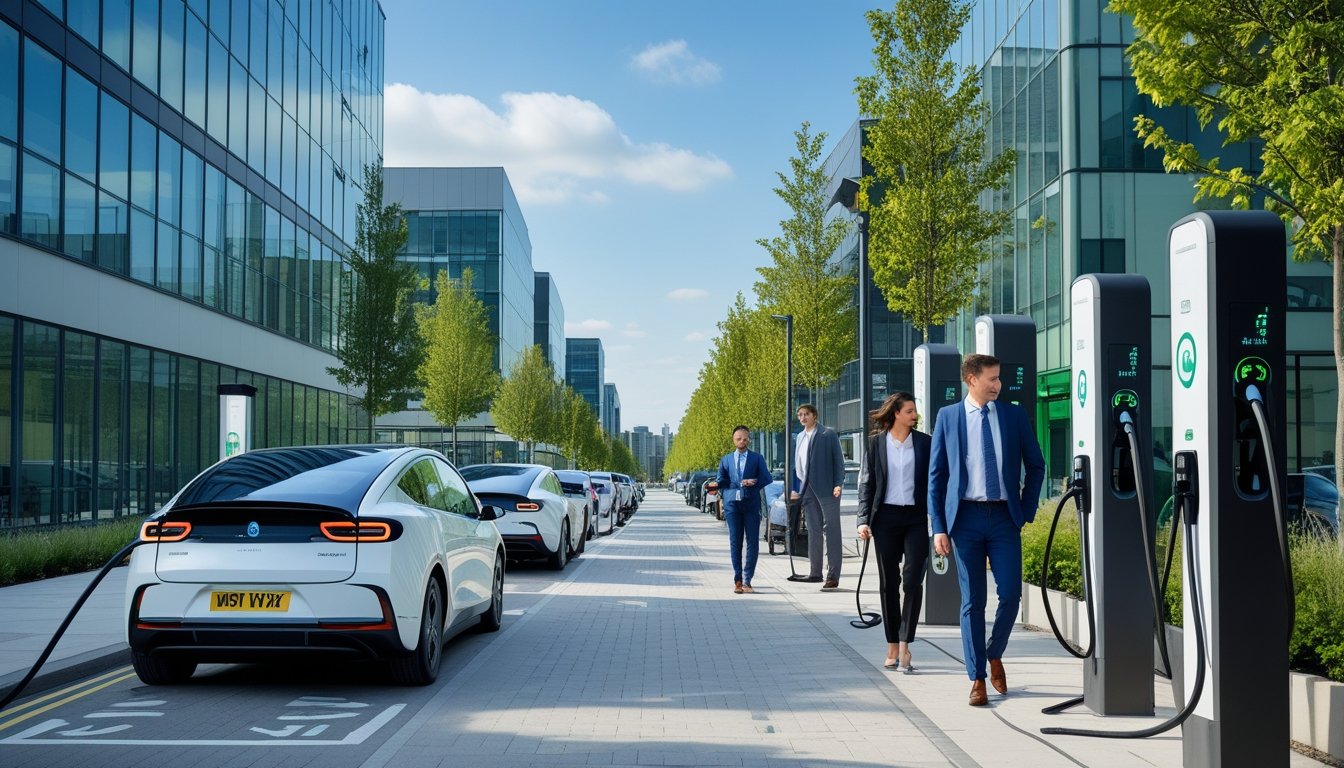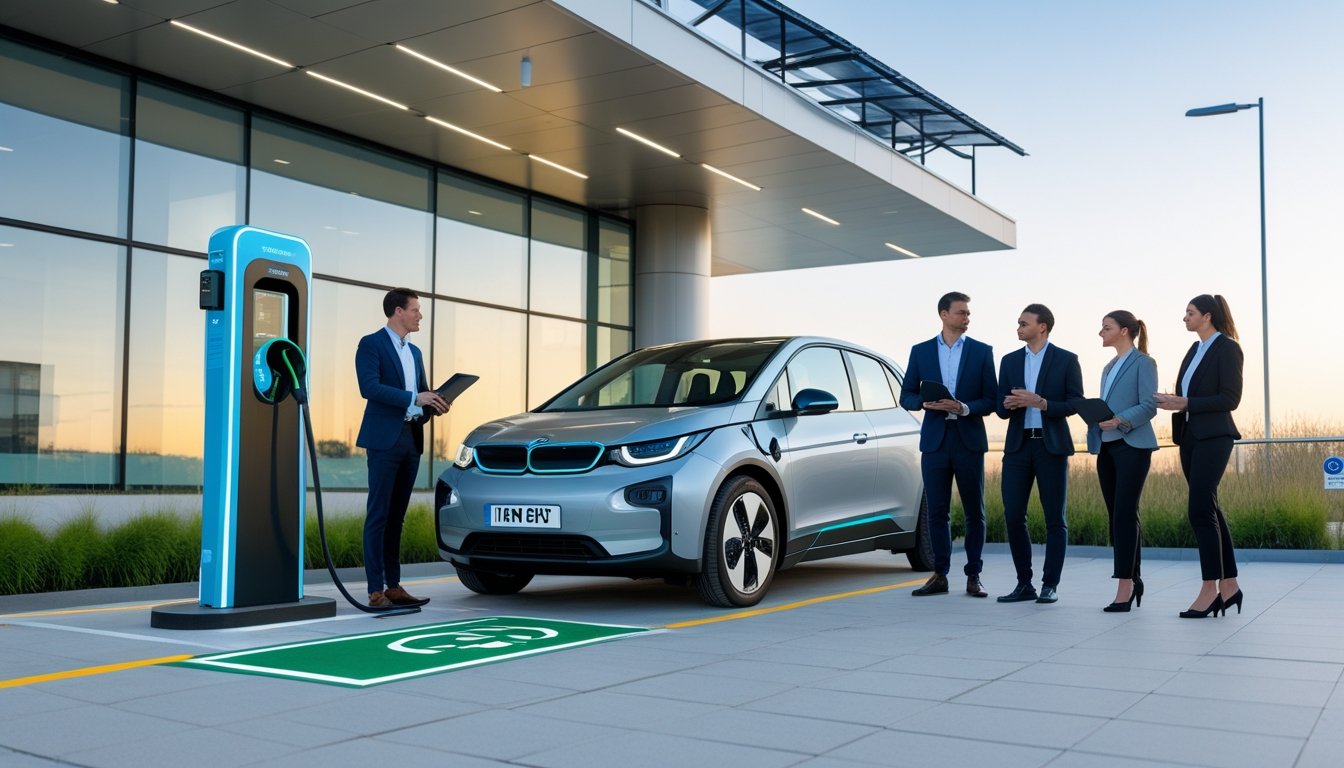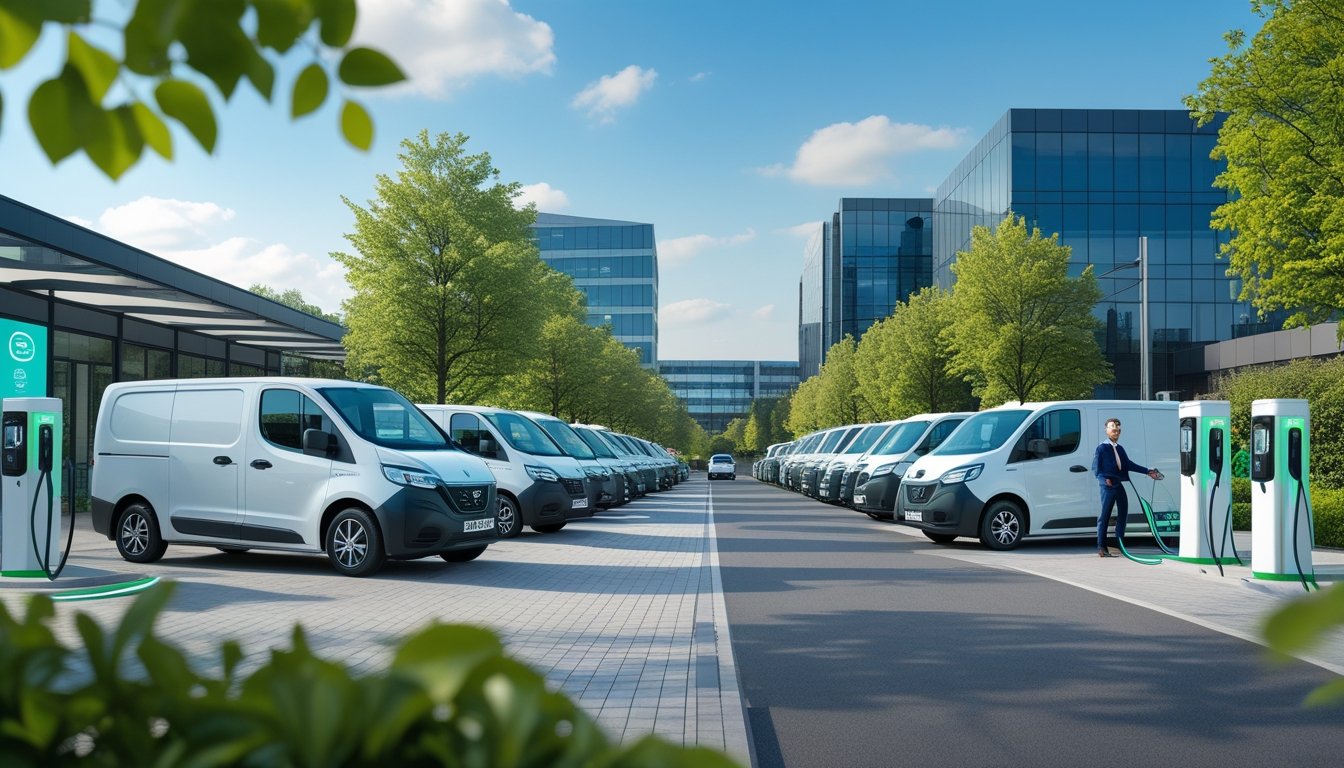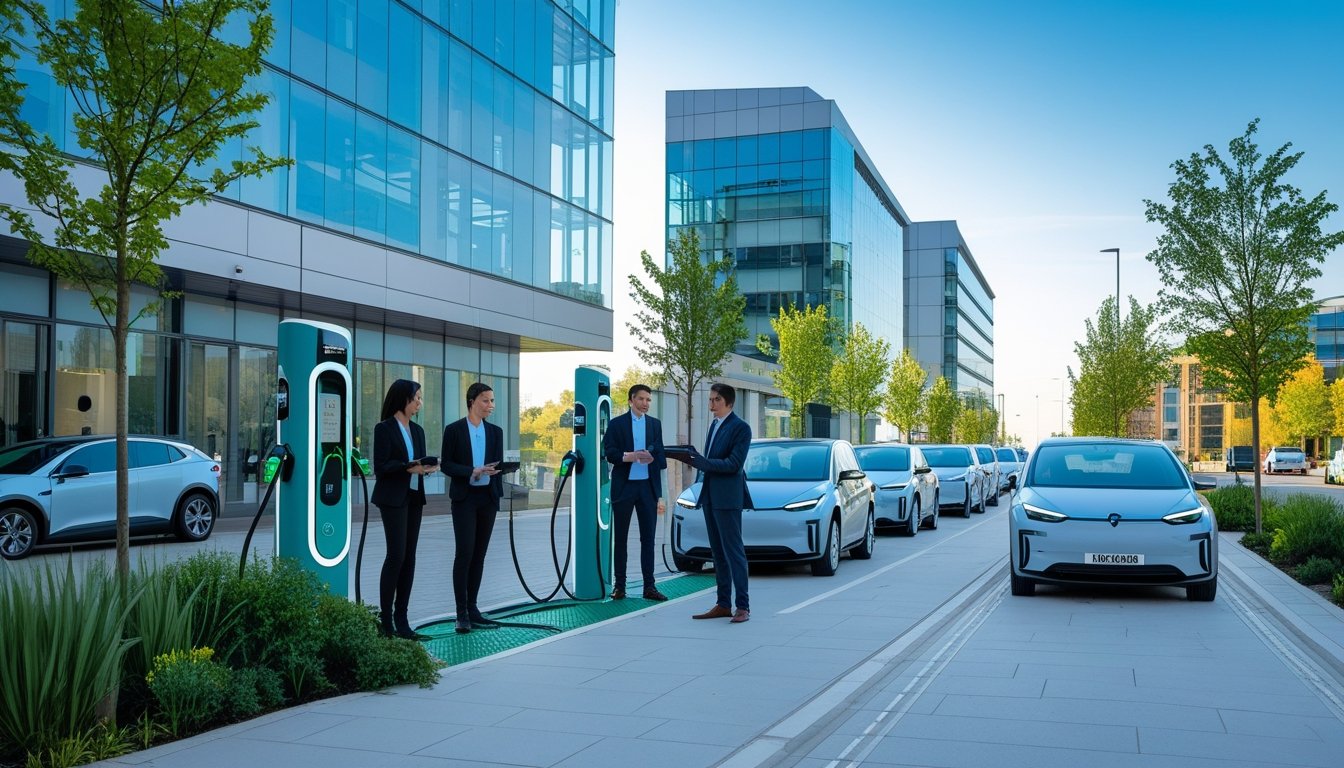Late updated: 29 Jul 2025 12:07
Written by: Amber Collins
The Role Of EVs In Reducing UK Business Emissions: Transforming Corporate Sustainability
Electric vehicles (EVs) are transforming the landscape of UK business, offering a tangible solution for reducing emissions. In a world increasingly focused on sustainability, businesses are keenly aware of their carbon footprint. By integrating EVs into their operations, companies in the UK can significantly curb emissions and contribute to a greener environment.

Adopting EVs is not just about meeting environmental targets; it also brings operational benefits. Cost savings from reduced fuel expenditure and lower maintenance costs can enhance a company's bottom line. As regulations tighten and consumer expectations shift, businesses that embrace EVs are strategically positioned to stay ahead.
Curiosity about the long-term benefits and challenges of EV adaptation fuels this dialogue. Delving into how businesses are innovating with this technology will shed light on the broader impact and reveal practical insights for companies considering this transition.
Key Takeaways
- EVs offer a practical solution for reducing business emissions.
- They provide economic benefits alongside environmental impact.
- Exploration of real-world applications reveals insights into business strategies.
How EVs Help Businesses Reduce Emissions in the UK

Electric vehicles (EVs) present a vital opportunity for UK businesses to significantly cut emissions while transitioning from fossil fuels. By adopting EVs, businesses can not only achieve carbon reduction targets but also drive innovation in decarbonisation efforts.
Decarbonising UK Business Transport
Incorporating EVs into operational fleets represents a key strategy for reducing carbon footprints. Traditional diesel vehicles contribute significantly to tailpipe emissions, making them targets for replacement. EVs, with their zero tailpipe emissions, offer a cleaner alternative. This transition is crucial as transportation accounts for a large share of the UK’s greenhouse gas emissions.
Switching to electric fleets directly supports the UK's climate change goals by lowering the carbon emissions of businesses. As regulations tighten, we see a growing trend towards the adoption of EVs which align with national policies and targets, thus enabling companies to comply with future standards while benefiting from cost savings.
Emissions Reduction From Replacing Diesel Fleets
Replacing diesel vehicles in company fleets with EVs is perhaps one of the most impactful actions businesses can take. Diesel engines are among the largest contributors to harmful emissions. By choosing electric alternatives, companies reduce their reliance on fossil fuels and contribute to pressing carbon reduction targets.
EVs help mitigate the adverse environmental effects associated with diesel, and businesses that switch can boast lower operational emissions. This transition not only aids in fulfilling corporate sustainability goals but also enhances the public image of businesses committed to reducing their environmental impact.
The Influence of Renewable Energy on EV Impact
The impact of electric vehicles on emission reduction is further magnified when powered by renewable energy sources. If businesses utilise clean energy to charge their EVs, the carbon emissions associated with fleet operations diminish even more significantly. This practice aligns perfectly with the UK government’s drive towards a net zero future.
By investing in renewable infrastructure, businesses can ensure that their EVs contribute to a sustainable ecosystem. This integration of technologies supports carbon neutrality ambitions, offering companies a competitive edge and fulfilling environmental commitments. It’s clear that the synergy between EVs and renewable energy presents a substantial opportunity to enhance environmental outcomes.
Wider Environmental and Operational Benefits for UK Businesses

Electric vehicles (EVs) offer a range of environmental and operational benefits to UK businesses. From reducing air and noise pollution to integrating cutting-edge energy storage and charging technologies, the transition towards EVs supports a sustainable and efficient business model.
Lower Local Air Pollution and Improved Air Quality
Switching to EVs significantly reduces local air pollutants such as nitrogen oxides (NOx) and particulate matter (PM). Traditional internal combustion engines are known to emit these harmful pollutants, contributing to poor air quality. In contrast, EVs produce zero tailpipe emissions, directly decreasing the levels of NOx and PM in urban environments.
By adopting electric fleet vehicles, businesses not only comply with environmental regulations but also help improve community health by reducing air pollution. Improved air quality can lead to better employee health and well-being, further enhancing workplace productivity. Cleaner air around business premises ensures a healthier environment, which is increasingly becoming a priority.
Noise Pollution Reduction in Workplace Environments
Electric motors in EVs operate much more quietly than traditional diesel or petrol engines. This noise reduction is particularly advantageous for businesses operating in urban areas or near residential zones. Decreased noise pollution can lead to a more pleasant environment for employees and nearby residents.
Quieter operation means less distraction and stress in the workplace. It allows teams to work more effectively without the constant hum of traditional engines in the background. Moreover, reduced noise pollution can play a role in enhancing customer experience, particularly in areas such as retail and hospitality.
Energy Storage and Charging Infrastructure Innovations
Recent advancements in energy storage and charging infrastructure are integral to the operational efficiency of EVs. Innovative energy storage solutions, such as advanced batteries, provide longer range and quicker charging times. These advancements support increased EV utilisation and reduced downtime, boosting overall business productivity.
Charging infrastructure is rapidly expanding, offering businesses more opportunities to integrate EV charging stations on their premises. This infrastructure growth supports employee adoption of EVs for commuting, enhancing workplace sustainability initiatives. By investing in cutting-edge charging solutions, businesses can position themselves as leaders in the sustainability space, all while benefiting from reduced fuel costs and enhanced operational efficiency.
Frequently Asked Questions

We've gathered answers to common questions on how electric vehicles (EVs) are helping UK businesses reduce emissions. Discover everything from government incentives to the infrastructure supporting EV adoption.
What incentives is the UK government offering businesses to transition to electric vehicles?
The UK government provides several incentives to encourage businesses to adopt EVs, like enhanced capital allowances. These allow savings on purchases of zero-emission vehicles. The plug-in grant also helps offset the cost of buying EVs for businesses. Additionally, there are exemptions from certain taxes like the congestion charge in urban areas.
How does the UK's electric vehicle infrastructure support the adoption of EVs in business fleets?
The UK's EV infrastructure supports businesses with an expanding network of charging stations, including fast and ultra-fast chargers. This infrastructure is critical for companies needing reliable, quick charging solutions. By improving accessibility and convenience, the UK government ensures smoother transitions for businesses looking to shift to electric fleets.
What is the UK government's strategy to achieve zero emissions with the help of electric vehicles?
The government has outlined plans such as banning the sale of new petrol and diesel cars by 2030. Pursuing net zero emissions, the strategy includes promoting EV adoption through various incentives and regulatory measures. Partnerships with industries are crucial, aiming to accelerate the development and adoption of clean transport technologies.
What does the UK's Zero Emission Vehicle (ZEV) mandate entail for businesses?
The UK's ZEV mandate obliges manufacturers to sell a specified number of zero-emission vehicles yearly. While not directly affecting businesses, it incentivises manufacturers to offer more EV options at competitive prices. This mandate indirectly supports business transitions to EVs by increasing market availability and choice.
How are electric vehicle statistics reflecting the progress in reducing business emissions in the UK?
EV adoption statistics show a significant increase in business-owned electric fleets, contributing to lower carbon emissions. More companies are setting sustainability targets and integrating EVs into their operations. Statistics reveal a direct impact on decreasing business-related transport emissions, aligning with national sustainability goals.
What are the key policies in the UK government's 2030 electric vehicle mandate for businesses?
Key policies include the phase-out of petrol and diesel vehicle sales by 2030. Support for businesses comes from incentives to upgrade fleets, investment in charging infrastructure, and regulations driving technological advancements in EVs. The mandate provides a clear timeline and framework, assisting businesses in planning their transition to electric transport.
